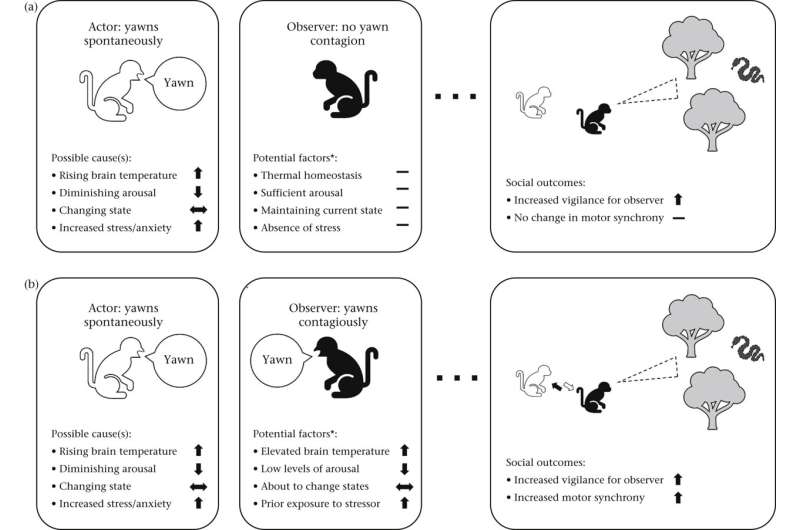Factors known to contribute to spontaneous and contagious yawning, and graphic illustrations of the social effects resulting from the observation of yawns in others both in the (a) absence and (b) presence of yawn contagion. ∗Note: potential factors explaining variability in yawn contagion are for species that show this capacity. Other variables like status and affiliation, as well as individual differences and personality factors related to social attention and biobehavioral synchrony (Gallup et al., 2021; Helt et al., 2021), are also known to influence this response. Credit: Animal Behaviour (2022). DOI: 10.1016/j.anbehav.2022.03.011
Andrew Gallup, an evolutionary biologist with the Psychology and Evolutionary Behavioral Sciences Program at SUNY Polytechnic Institute in New York has published a paper in the journal Animal Behavior outlining research into the reason that animals yawn. He suggests there could be a variety of reasons for it but believes it mostly likely signals members of a social group that the yawner is not alert, so others should be.
Gallup has been studying yawning for several years, though it was only recently that he decided to take a more serious look at possible reasons for it. He searched for published papers involved in the study of yawning and compared what other researchers had found. He then compiled a consensus of the sorts of reasons behind yawning.
Yawning, he notes, is little more than a reflex that involves the inhalation of air, stretching of the eardrums, and a wide-open mouth, which pulls the jaw down.
In the published papers, he found researchers had ruled out the possibility of yawing providing a sudden increase in blood oxygen levels. But he also discovered evidence of yawning cooling the brain slightly. He notes that researchers have also found that initial yawns—those not instigated by seeing someone else yawn—generally occur during environmental changes. A person moving from hot to cold or vice versa, for example, or from sleep to waking. Researchers have also found that yawning leads to an increase in cortical arousal, which could be construed as a person feeling more alert. Additionally, several researchers found evidence that yawning evolved as a means for one animal to subtly notify others nearby of their less-than-alert condition, suggesting that others should take over watching for threats.
As for why so many animals yawn when seeing someone else yawn, sometimes even members of other species, Gallup suggests the research shows it is likely a means for maintaining group alertness.
More information: Andrew C. Gallup, The causes and consequences of yawning in animal groups, Animal Behaviour (2022). DOI: 10.1016/j.anbehav.2022.03.011
Journal information: Animal Behaviour , Animal Behavior
© 2022 Science X Network
























